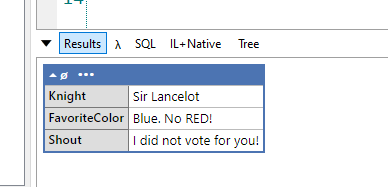C# anonymous types seem really useful, but I've pretty immediately hit upon an application where I would like to set the property of an anonymous type, and I'd also like to be able to use attributes.
My application is a general purpose stored procedure and SQL executor, which can automatically map C# properties to SQL input and output paramaters with appropriate SqlDbType (e.g. string maps to NVARCHAR(MAX), etc.).
e.g.
int PersonID = 1234;
var output = new { GivenName = (string)null, FamilyName = (string)null };
sqlExecutor.ExecSQL("SELECT @GivenName = GivenName, @FamilyName = FamilyName FROM People WHERE PersonID = @PersonID", new { PersonID }, output);
string GivenName = output.GivenName;
string FamilyName = output.FamilyName;
The approach works (also for stored procedures, I just used raw SQL in the above to make it clearer what I am trying to do). But I can only make it work, in exactly the form above, by using the 'bad idea' of setting the backing fields in the anonymous output object (using code in the answer by user Alex to How to set value for property of an anonymous object?).
I can't think of any other way to create such an easy to use, lightweight interface for this kind of problem. It's pretty easy to see that attributes might be useful here too, e.g. to modify the parameter mapping.
So why are anonymous types limited to no setting and no attributes? Those both seem as if they would be useful in reasonable use-cases, and as if they would be easy features to include, given that the basic anonymous type feature is already in the language.


dynamicwork better here? – PortraitureExpandoObject, and it associates a typed value with a name, which doesn't work for me (I don't think?) in the case where the value can be null. – Grube